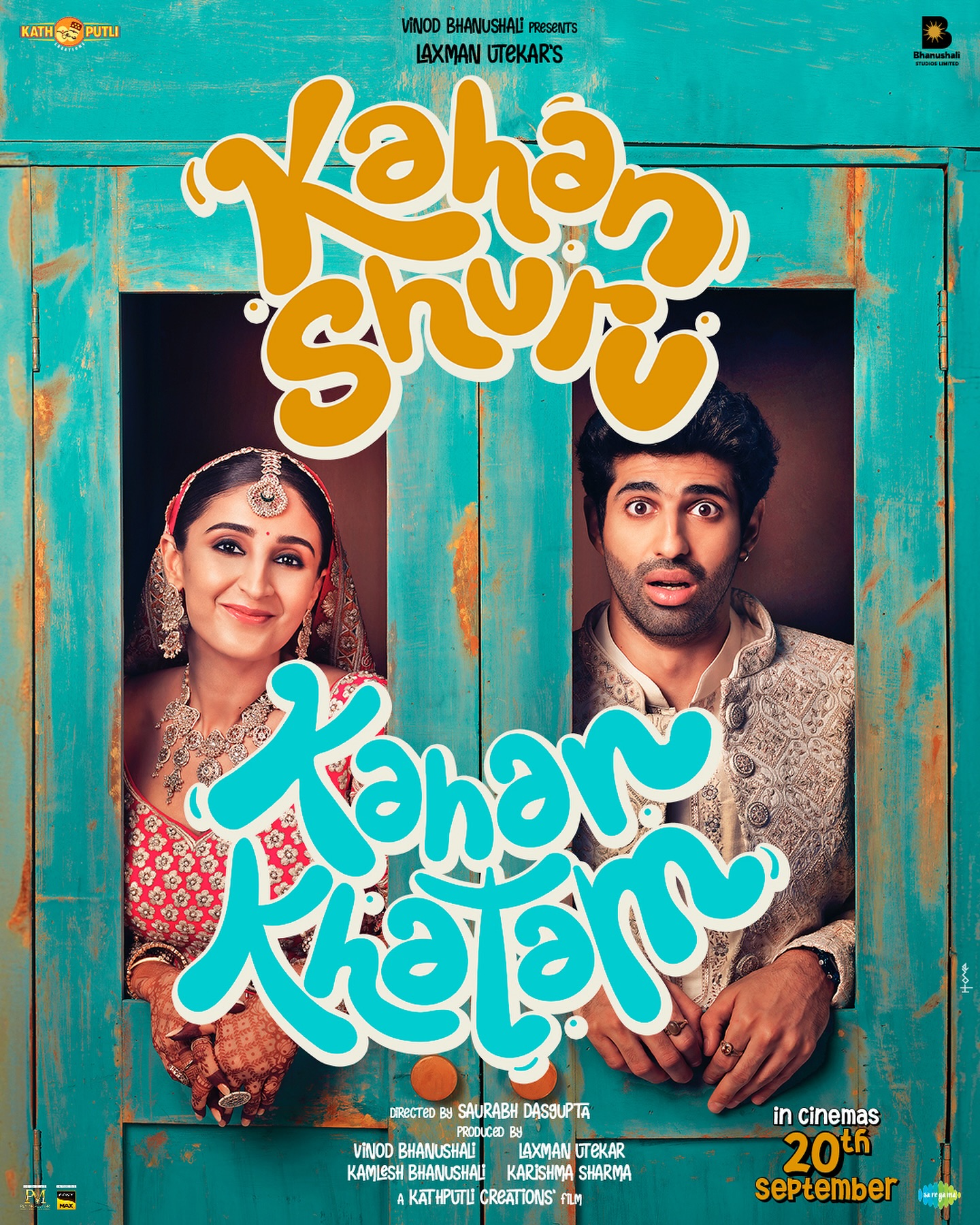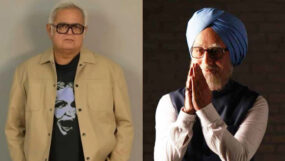
Film:
Kahan Shuru Kahan Khatam movie
Director: Saurabh Dasgupta
Writer: Laxman Utekar, Rishi Virmani
Star cast: Dhvani Bhanushali, Rajesh Sharma, Aashim Gulati, Supriya Pilgaonkar, Vikram Kochhar, Rakesh Bedi, Akhilendra Mishra, Chittaranjan Tripathy, Vikas Verma, Sonali Sachdev, Gaurav Manwani
Platform: In theatres
Runtime: 1h 46m
Kahan Shuru Kahan Khatam Review
Story
Set in Haryana, Meera played by Dhvani Bhanushali, is a young woman navigating the restrictive confines of a patriarchal household. Raised in a male-dominated environment, Meera is independent in spirit but finds herself trapped in a pre-arranged marriage organised by her controlling father, without her consent. On the verge of being tied down in a life she hasn’t chosen, Meera takes matters into her own hands—quite literally—by fleeing from her wedding.
Enter Krishna, portrayed by Aashim Gulati, at precisely the wrong place and time. Caught in the whirlwind of Meera’s escape, Krishna is mistakenly perceived as her partner in this dramatic elopement. The film cleverly ramps up the chaos as Krishna’s parents mistakenly assume Meera is their new daughter-in-law. On the other hand, Meera’s brothers, intent on safeguarding their family honour, launch an aggressive manhunt to find the runaway bride and her accidental accomplice. Will Meera bow to tradition and marry the man chosen by her father? Or will she carve her path and follow her heart?
What’s good
Kahan Shuru Kahan Khatam is a refreshing and lighthearted film that offers a delightful mix of humour and emotion. The first half is particularly strong, delivering a hilarious and fast-paced narrative that hooks the audience. The comedic timing, combined with the sharp chemistry between Dhvani Bhanushali and Aashim Gulati, injects moments of levity and charm. Their interactions are the backbone of the film’s success, and their natural ease on screen elevates the otherwise predictable plot.
However, the film struggles to maintain its momentum in the second half. As the storyline progresses, the narrative becomes less focused, losing the crispness that defines its initial appeal. Despite this, the light-hearted tone and engaging sequences manage to keep the audience entertained, even if the plot becomes somewhat meandering toward the climax.
Saurabh Dasgupta’s direction is competent, if not groundbreaking. He strikes a balanced tone by blending the right doses of drama and comedy. Yet, the film remains coherent and avoids unnecessary melodrama or even veering into excessive subplots.
What’s not
Music: Unfortunately, the film’s soundtrack falls flat and fails to leave a lasting impression. While the songs align with the movie’s overall tone—whether it’s a romantic ballad or an upbeat party number—none of them manage to stand out. They blend too seamlessly into the background, serving as mere fillers rather than memorable highlights. Despite fitting the film’s vibe, the tracks lack the distinctiveness or catchiness required to earn a spot on anyone’s playlist.
Script Analysis & Screenplay
Kahan Shuru Kahan Khatam opens with a portrayal of a regressive family dynamic, where the daughter is viewed as a mere liability—a tool for maintaining a family image, devoid of consideration for her feelings or desires. Written by Laxman Utekar, the director of Zara Hatke Zara Bachke, in collaboration with Rishi Virmani, the film opts for a simple, light-hearted narrative, steering clear of excessive drama or chaos. Their intention is clear: to craft a charming love story that doesn’t get bogged down by technicalities, offering a breezy, entertaining watch.
The film is peppered with moments of humor, from COVID lockdown jokes to well-executed physical comedy by the actors, ensuring it hits the mark as an enjoyable experience. While it aims to tackle themes of women’s empowerment, the film’s messaging, though sincere, comes across as heavy-handed. Meera’s decision to flee her wedding—a direct result of her father’s failure to seek her consent—reflects her desire for agency in a society that rarely grants it. Her reasoning is undeniably justified, and the narrative highlights the complexities of familial relationships, suggesting that while confronting regressive traditions may seem straightforward, it’s often far more nuanced.
The film also sheds light on the contrasting treatment of women across different regions of the same country. However, as the story unfolds, particularly toward the climax, the screenplay begins to stumble. The balance between drama and comedy falters, and the film becomes overly didactic in its messaging. The climax, in particular, may leave viewers feeling disconnected. Meera’s father’s sudden epiphany about the importance of women—spurred by a dramatic confrontation where the women of the family shed their veils and stand up for themselves—feels overly preachy and forced. While the intention is noble, the execution lacks subtlety, making the final act feel contrived and melodramatic rather than impactful.
Kahan Shuru Kahan Khatam poster

Image source: Dhvani Bhanushali Instagram
Performance
Dhvani Bhanushali makes a promising Bollywood debut in Kahan Shuru Kahan Khatam, delivering a decent performance as Meera, the runaway bride with strong values. For the first film, Dhvani seems quite confident. She brings a refreshing presence to the screen, embodying the character nicely. While there’s room for growth, her performance is certainly a solid start to her acting career, showing potential to evolve with more challenging roles.
Aashim Gulati, on the other hand, plays the mischievous Krishna with a balance of carefree charm and emotional depth. His boyish appeal complements his character’s fun-loving nature, but what stands out is his ability to show empathy and understanding without losing his playful edge. Though not a standout performance, Aashim delivers a decent portrayal of Krishna.
Supporting cast
The supporting cast also adds to the film’s appeal. Rajesh Sharma, in his limited screen time, is flawless as Meera’s regressive father, perfectly capturing the character’s deep-rooted patriarchal mindset. Supriya Pilgaonkar, though in a cameo, leaves a lasting impact with her warmth and grace, while Vikram Kochhar delivers entertainment with his spot-on expressions. Rakesh Bedi shines as Krishna’s father, his impeccable comic timing lifting even the simplest scenes. Akhilendra Mishra also manages to impress in his brief appearance, showcasing his trademark flair for comedy.
Chittaranjan Tripathy, Vikas Verma, Sonali Sachdev, and Gaurav Manwani may have smaller roles, but they contribute effectively to the story. They make the ensemble cast a well-rounded support to the leads.
Conclusion
Overall in the review, Kahan Shuru Kahan Khatam is a mindless comedy that is enjoyable to watch. The movie will strike a chord with audiences who enjoy light-hearted family dramas. It is a blend of humour, chaos, and introspection, wrapped in a heartwarming story about breaking free from societal norms. While not entirely groundbreaking, it’s a pleasant watch that encourages viewers to reflect on the age-old battle between tradition and individual choice. It’s a fun, feel-good watch that doesn’t require deep engagement with its themes but leaves a lingering message about the importance of women’s voices and choices.
Watch the Kahan Shuru Kahan Khatam trailer after the review
































Leave a Reply